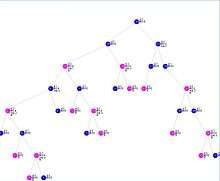Arborescent
Arborescent (French: arborescent) is a term used by the French thinkers Deleuze and Guattari to characterize thinking marked by insistence on totalizing principles, binarism, and dualism. The term, first used in A Thousand Plateaus (1980) where it was opposed to the rhizome, comes from the way genealogy trees are drawn: unidirectional progress, with no possible retroactivity and continuous binary cuts (thus enforcing a dualist metaphysical conception, criticized by Deleuze). Rhizomes, on the contrary, mark a horizontal and non-hierarchical conception, where anything may be linked to anything else, with no respect whatsoever for specific species: rhizomes are heterogeneous links between things that have nothing to do between themselves (for example, Deleuze and Guattari linked together desire and machines to create the - most surprising - concept of desiring machines). Horizontal gene transfer is also an example of rhizomes, opposed to the arborescent evolutionism theory. Deleuze also criticizes the Chomsky hierarchy of formal languages, which he considers a perfect example of arborescent dualistic theory.[1]

References
- Deleuze, Gilles and Guattari, Félix. 1980. A Thousand Plateaus. Trans. Brian Massumi. London and New York: Continuum, 2004. Vol. 2 of Capitalism and Schizophrenia. 2 vols. 1972-1980. Trans. of Mille Plateaux. Paris: Les Editions de Minuit. ISBN 0-8264-7694-5.